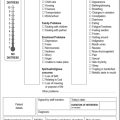3 How the cancer situation can be improved
How to prevent cancer developing
• Government and local policy: for example, the banning of smoking in public places; taxation of cigarettes and alcohol; national vaccination programmes, such as the human papillomavirus vaccine for teenage girls (16 and 18 strains); health and safety at work: Control of substances hazardous to health (COSHH) regulations and advertising (COSHH 2002).
• Individually: everyone has the opportunity to make small changes in their lifestyle to reduce their cancer risk, such as giving up smoking; eating a well-balanced diet with plenty of fruit and vegetables; safe sexual practice (using a condom); applying sun screen appropriately (correct sun protection factor (SPF) for skin type and sun intensity, applied at correct time intervals); and taking exercise to maintain a healthy body mass index.
How survival rates can be improved
Alternatively, listen to a patient’s story on the healthtalkonline.org Website, for example: http://www.healthtalkonline.org/Cancer/Colorectal_Cancer/Topic/1061/ (accessed November 2011)
Early detection of cancer depends on people knowing what to look for and seeking prompt advice from their doctor (Box 3.1). Education is essential for people to understand how the body works; knowing what is normal for our own bodies helps us detect when something changes. Fear can play a large part in delaying seeking help and is often driven by ‘I don’t want to know’ or ‘they won’t be able to do anything for me’. These feelings may be based on previous family experiences or out-of-date information. It is important to educate people that cancer can often be treated and have a good outcome if it is detected and treated early, emphasising that it is vitally important to note any changes in body function or appearance.
Box 3.1 Signs of cancer for men and women
 An unusual lump or swelling anywhere on the body
An unusual lump or swelling anywhere on the body
 A change in the size, shape or colour of a mole
A change in the size, shape or colour of a mole
 A sore that won’t heal after several weeks
A sore that won’t heal after several weeks
 An unexplained pain or ache that lasts longer than 4 weeks
An unexplained pain or ache that lasts longer than 4 weeks
 A cough or croaky voice that lasts longer than 3 weeks
A cough or croaky voice that lasts longer than 3 weeks
 Unexplained weight loss or heavy night sweats
Unexplained weight loss or heavy night sweats
 Persistent difficulty swallowing or indigestion
Persistent difficulty swallowing or indigestion
 A change to more frequent bowel motions that lasts longer than 6 weeks
A change to more frequent bowel motions that lasts longer than 6 weeks
 A mouth or tongue ulcer that lasts longer than 3 weeks
A mouth or tongue ulcer that lasts longer than 3 weeks
 Bleeding from the vagina after the menopause or between periods
Bleeding from the vagina after the menopause or between periods
Screening
Wilson and Junger (1968) developed 10 principles (for the World Health Organisation) that should govern a national screening programme:
1. The condition should be an important health issue.
2. The natural history of the disease should be well understood.
3. There should be a recognisable early stage which is responsive to treatment.
4. A suitable and acceptable test should exist.
5. The population to be screened can be identified.
6. An interval period must be decided upon.
7. There needs to be adequate facilities to cope with the abnormalities detected.
8. Treatment must be available and acceptable to the population.
9. The cost of screening must be viable.
10. Overall the benefits of screening should outweigh the harm.
Consider Wilson and Junger’s (1968) (see References) 10 principles of screening. Why do we have a breast screening programme and not a prostate screening programme?
Cervical screening
The evidence in favour of screening for cancer of the cervix is convincing. Of the 4 million women in the UK invited for screening in 2007–2008, 3.3 million were tested and 93% were negative (NHS Cervical Screening Programme Statistical Bulletin (England 2009–10)).
Breast screening
The UK NHS Breast Screening Programme (1986) was the first of its kind in the world and national coverage was achieved by the mid 1990s. There have been numerous adjustments to the programme since this time. Currently all women aged 47 to 73 years are sent a letter inviting them to attend for a mammography every 3 years. Women over 73 can request screening.
In 2007–2008, of the 2.5 million women invited for screening, a total of 2 million were screened and 16 449 cancers were detected (Cancer Research UK 2010). Breast screening is well established and shown to be effective, lowering mortality rates (55–69 years) and saving approximately 1250 lives per year.
Cancer Research UK. Breast screening statistics. Online. Available at: http://info.cancerresearchuk.org/cancerstats/types/breast/screening/, 2010. (accessed November 2011)
Health and Safety Executive, 2002. Control of substances hazardous to health (COSHH). HSE. London.
NHS Breast Screening Programme. The Forrest report. Online. Available at: http://www.cancerscreening.nhs.uk/breastscreen/publications/forrest-report.html, 1986. (accessed November 2011)
NHS Cervical Screening Programme Statistical Bulletin (England 2009–10). Online. Available at: www.cancerscreening.nhs.uk (accessed May 2011).
Wilson J.M.G., Junger G.. Principles and practice of screening for disease. Public Health Paper 34.. Geneva:World Health Organisation; 1968.






